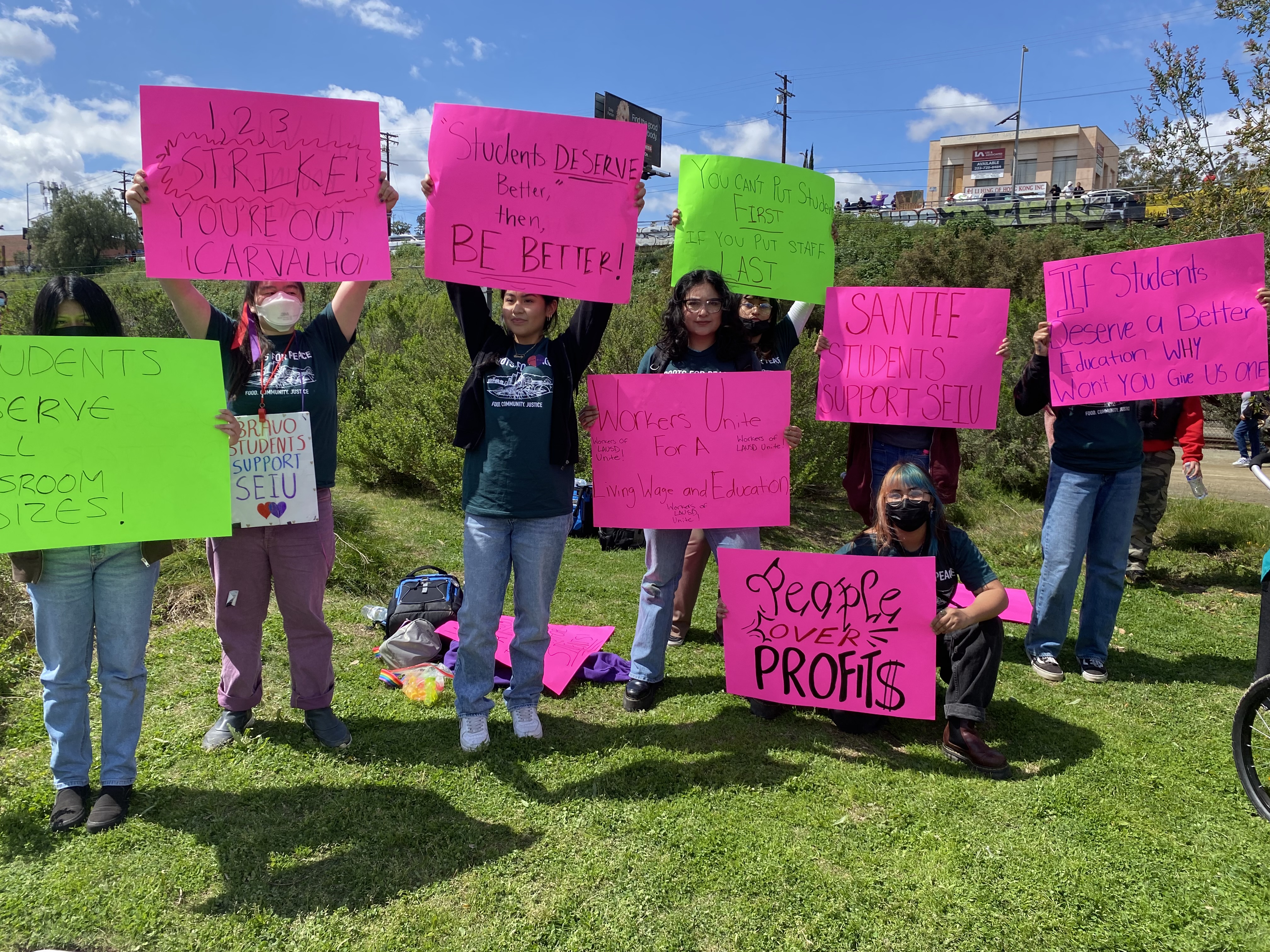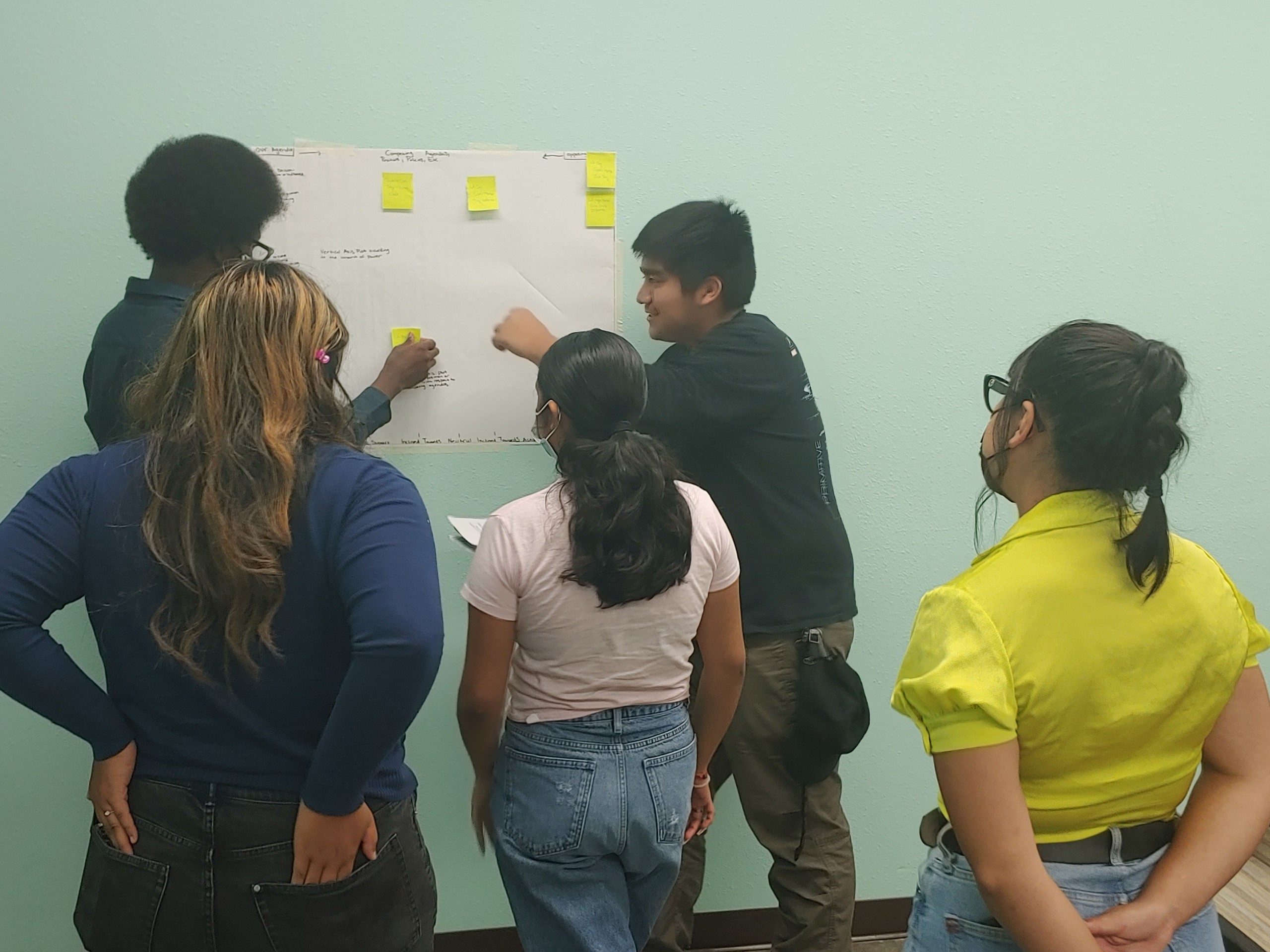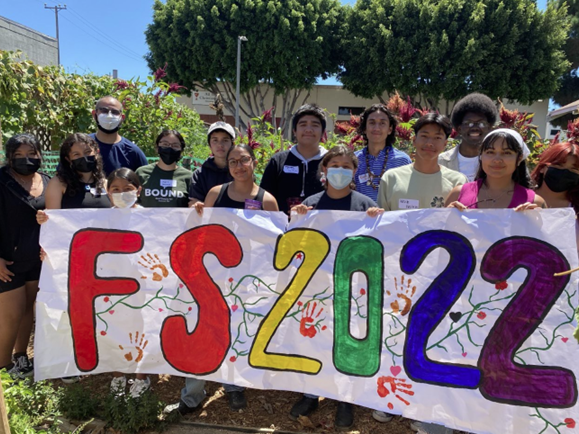
Youth in Los Angeles protest for more resources for schools and staff. Dulcinea Arroyo
Dulcinea Arroyo has served as the PADOSI Fellow with Los Angeles Roots for Peace (RFP) since May 2022. In these interview excerpts, she describes her organizing work with youth and the summer RFP Freedom School.
The Freedom School is a free, 14-day intensive social justice training where young people of color analyze intersectional systemic inequalities. This includes envisioning and organizing around local projects, policies, and practices that build personal and community healing. The 2023 Freedom School is set for June 27-August 12.
What have you been working on?
Things have been very busy. We’re now in the middle of our youth organizing program while recruiting and doing outreach for our next Freedom School that will start in June.
We’ve also been doing coalition work with ACT LA (Alliance for Community Transit) and Students Deserve. The first supports public, universal transportation and the second one is getting cops out of schools and having that money instead be invested in school resources that will specifically benefit Black students.
In the past two weeks, we've been to several board meetings for Metro, the company that owns many of the transportation services here in Los Angeles. They’ve been voting on whether to recontract LAPD specifically for Metro transportation services.
As part of ACT LA, our argument is that these cops do not make people feel safer on Metro platforms. They do not respond in time. Instead, we're asking for Metro ambassadors who would provide services, for example, for the homeless population and inform people who may need help while riding the Metro, loading their tap cards etc.

Youth with Roots for Peace Dulcinea Arroyo
Leading up to the Freedom School, what sort of organizing work are you doing?
For the Freedom School project that will start in June, we’re beginning our outreach efforts. We are primarily in South Central Los Angeles, which is an historic landmark space in LA that’s a predominantly Latino, migrant, working-class community. And of course, the students in those high schools do not have the best resources and access to college readiness or even coursework that really orients them to the society around them.
We really want to expand our efforts and multiply all the high schools that we reach out to by almost threefold. These efforts do require a lot of time for communication back and forth with administration and teachers, scheduling presentations etc. And because our team is quite small, I am really taking on much of that work.
We want to expand the number of students who get into our Freedom School program so that we have better diversity. We see in these historic high schools the need for adult community members who care for the future of those students and care that they are provided with services that will help them develop as individuals -- to set them up for a better future, whatever it is that they choose to do for themselves.
I’m glad to see our curriculum becoming stronger and more radical – to really push the youth to question society around them and empower them to be creators in their community, to speak up for themselves and those around them. It's a beautiful journey, and it requires a lot of groundwork.
What is Freedom School about?
I think the Freedom School, at its core, is really a space for students to learn about history, and it's kind of a mixture of history and sociology, right? Because we learn about the history of how it is that Black folks and brown folks, in their distinctive histories, came to be in different situations in society.
Why does migration happen? Why are there a lot of people in prisons? Why are Black and brown people predominantly the ones who are poor and working class? So it answers all those questions.
At the same time, it allows students to know the systems that create these conditions: capitalism, imperialism, colonization, etc. So that way the youth know that it's not just individual people who go through hard times in life, but really there are systems in place that create these injustices, oppression, inequality in life. They are fundamentally part of our society, and because of that we need to work to eradicate them.
To do this kind of work, you can’t just throw youth out there and start canvassing and doing campaigns and stuff without giving them this historical context and worldview. And that's what Freedom School does. That's why we have Freedom School followed by the youth organizing program.
What have you learned about yourself through this experience?
Well, coming into the PADOSI Fellowship, I already knew my long-term goal is to go to graduate school, so I think that this experience has just informed that even more.
I want to build my expertise. I want to better myself academically a little bit more so that what I've done at RFP -- that is, being a mentor to these youth -- is something that I can also do when I go off to graduate school and then become a mentor for working-class students.
This experience has just further solidified the fact that it requires people from our very own communities who deeply care about the situations going on to truly create a new way of being, of living, of relating to one another. It’s been a beautiful time and it's gone by really fast. But I've learned a new perspective of what I want and what I want to do. It has helped me grow as a person.

RFP Freedom School summer 2022 Dulcinea Arroyo